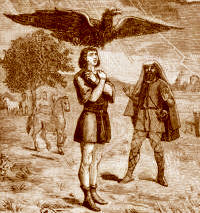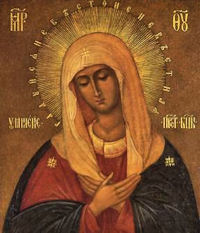Daily Readings for: June 08, 2012
(Readings on USCCB website)
Collect: O God, whose providence never fails in its design, keep from us, we humbly beseech you, all that might harm us and grant all that works for our good. Through our Lord Jesus Christ, your Son, who lives and reigns with you in the unity of the Holy Spirit, one God, for ever and ever.
Ordinary Time: June 8th
Friday of the Ninth Week of Ordinary Time
Old Calendar: Mary, Mediatrix of All Graces; St. Medard (Hist)
According to the 1962 Missal of Bl. John XXIII the Extraordinary Form of the Roman Rite, today is the feast of Mary, Mediatrix of All Graces. Pope Leo XIII declared in his Encyclical of September 22, 1891: "We may affirm that nothing, by the will of God, is given to us without Mary's mediation, in such way that just as no one can approach the almighty Father but through His Son, likewise no one, so to speak, can approach Christ but through His Mother."
Mentioned in the Roman Martyrology from 1961, we observe the "birthday" of St. Médard, Bishop of Noyon, France. (When the Church uses the word "Birthday" in regard to saints, She refers to the commemoration of the day on which the saint died.) Legend says that a sudden shower once fell, soaking everyone except St Médard who remained perfectly dry, because an eagle had spread its wings over him. Ever since, Médard was known as maître de la pluie—master of rain. In religious art, an eagle shelters Médard from the rain.
Mary, Mediatrix of All Graces
Traditionally, today is the feast of Mary, Mediatrix of All Graces. All the graces which flow from the redemption of Jesus Christ are granted to the human family through the motherly intercession of Mary. Mary mediated Jesus Christ, the Author of all graces, to the world when she agreed to be the human mother of God made man (cf. Lk 1:38). And from the cross at Calvary (Jn 19:26) and as the final gift to humanity, Jesus gives Mary as a spiritual mother to us all: "Son, behold your mother" (cf. Jn 19:26). For this reason, Vatican II refers to Mary as a "mother to us in the order of grace " (Lumen Gentium, n. 62) and several twentieth century popes have officially taught the doctrine of Mary as Mediatrix of all graces, quoting the words of St Bernard: "It is the will of God that we obtain all favours through Mary." The Mediatrix performs this task in intimate union with the Holy Spirit, the Sanctifier, with whom she began the drama of our Lord's Redemption at the Annunciation (cf. Lk. 1:35).
Thirdly, Mary is our Advocate for people of God, in that she takes the petitions of her earthly children, especially in times of difficulties, and brings them through her maternal intercession before her Son and our Lord Jesus.
In the Old Testament, the Queen Mother brought the petitioned needs of the people of Israel to the throne of her son the king (cf. 1 Kings 2:19). Now Mary is the new Queen Mother and Advocate in the new Kingdom of her Son, who brings the petitioned needs of the people of God to the throne of her glorious Son, Christ the King, particularly in our present difficult times.
The universal mediation of the Mother of Jesus as Coredemptrix, Mediatrix of all graces, and Advocate for the people of God is already contained in the official and authoritative teachings of the Church's Magisterium. Now, at the summit of the Marian era, what remains is the final proclamation by the Church of this final Marian doctrine as Christian dogma revealed by God.
Things to Do:
St. Médard
Bishop of Noyon, b. at Salency (Oise) about 456; d. in his episcopal city June 8, about 545. His father, Nectardus, was of Frankish origin, while his mother, named Protagia, was Gallo-Roman. It is believed that St. Gildardus, Bishop of Rouen, was his brother. His youth was entirely consecrated to the practise of Christian virtues and to the study of sacred and profane letters. He often accompanied his father on business to Vermand and to Tournai, and frequented the schools, carefully avoiding all worldly dissipation.
 His exemplary piety and his knowledge, considerable for that time, decided the Bishop of Vermand (d. 530) to confer on him Holy Orders, and caused him to be chosen as his successor. Forced, in spite of his objections, to accept this heavy charge, he devoted himself zealously to his new duties. In an effort to accomplish those duties in greater security, since Vermand and the northern part of France in general were then generally troubled by wars and exposed to the incursions of the barbarians, he removed his episcopal see in 531 from Vermand, a little city without defence, to Noyon, the strongest place in that region.
His exemplary piety and his knowledge, considerable for that time, decided the Bishop of Vermand (d. 530) to confer on him Holy Orders, and caused him to be chosen as his successor. Forced, in spite of his objections, to accept this heavy charge, he devoted himself zealously to his new duties. In an effort to accomplish those duties in greater security, since Vermand and the northern part of France in general were then generally troubled by wars and exposed to the incursions of the barbarians, he removed his episcopal see in 531 from Vermand, a little city without defence, to Noyon, the strongest place in that region.
The year following, St. Eleutherius, Bishop of Tournai, died and St. Médard was invited to assume the direction of that diocese also. He refused at first, but being urged by Clotaire himself he at last accepted. This union of the two dioceses lasted until 1146, when they were again separated.
Clotaire, who had paid him a last visit at Noyon, had his body transferred to the royal manor of Crouy at the gates of the city of Soissons. Over the tomb of St. Médard was erected the celebrated Benedictine abbey which bears his name.
St. Médard was one of the most honoured bishops of his time, his memory has always been popularly venerated in the north of France, and he soon became the hero of numerous legends. One of which says that if it rains on St. Médard's feast day it will be followed by forty days of rain; and forty days of sunshine will follow if it is clear.
Excerpted from the Catholic Encyclopedia
Patron: against bad weather; against imprisonment; against sterility; brewers; captives; harvests; for good weather; for rain; imprisoned people; mentally ill people; peasants; prisoners; toothache; vineyards.
Symbols: two white doves; three white doves; eagle; knife; ox; colt; torch; tooth;
Often Portrayed as: being sheltered from rain by an eagle or other large bird; holding a citadel; laughing aloud with his mouth wide open; leaving footprints in stone; with two horses at his feet
Things to Do:
- Fourteen centuries ago as bishop of Tournai in Picardy, France, Médard founded the annual Rose Festival (Fetes des Roses). It is still held there on this day, and the region's most beautiful and virtuous maiden is crowned.

 His exemplary piety and his knowledge, considerable for that time, decided the Bishop of Vermand (d. 530) to confer on him Holy Orders, and caused him to be chosen as his successor. Forced, in spite of his objections, to accept this heavy charge, he devoted himself zealously to his new duties. In an effort to accomplish those duties in greater security, since Vermand and the northern part of France in general were then generally troubled by wars and exposed to the incursions of the barbarians, he removed his episcopal see in 531 from Vermand, a little city without defence, to Noyon, the strongest place in that region.
His exemplary piety and his knowledge, considerable for that time, decided the Bishop of Vermand (d. 530) to confer on him Holy Orders, and caused him to be chosen as his successor. Forced, in spite of his objections, to accept this heavy charge, he devoted himself zealously to his new duties. In an effort to accomplish those duties in greater security, since Vermand and the northern part of France in general were then generally troubled by wars and exposed to the incursions of the barbarians, he removed his episcopal see in 531 from Vermand, a little city without defence, to Noyon, the strongest place in that region.